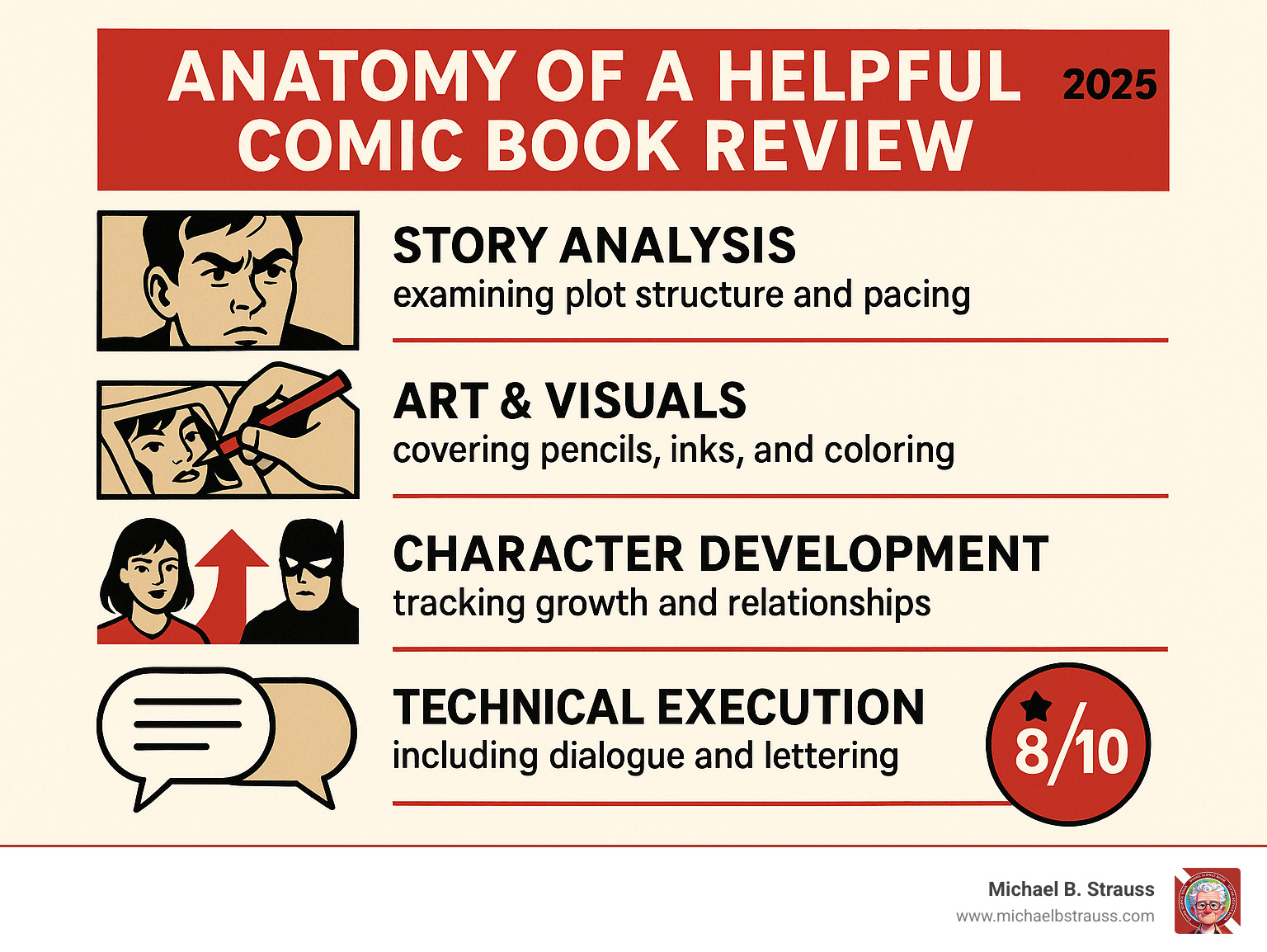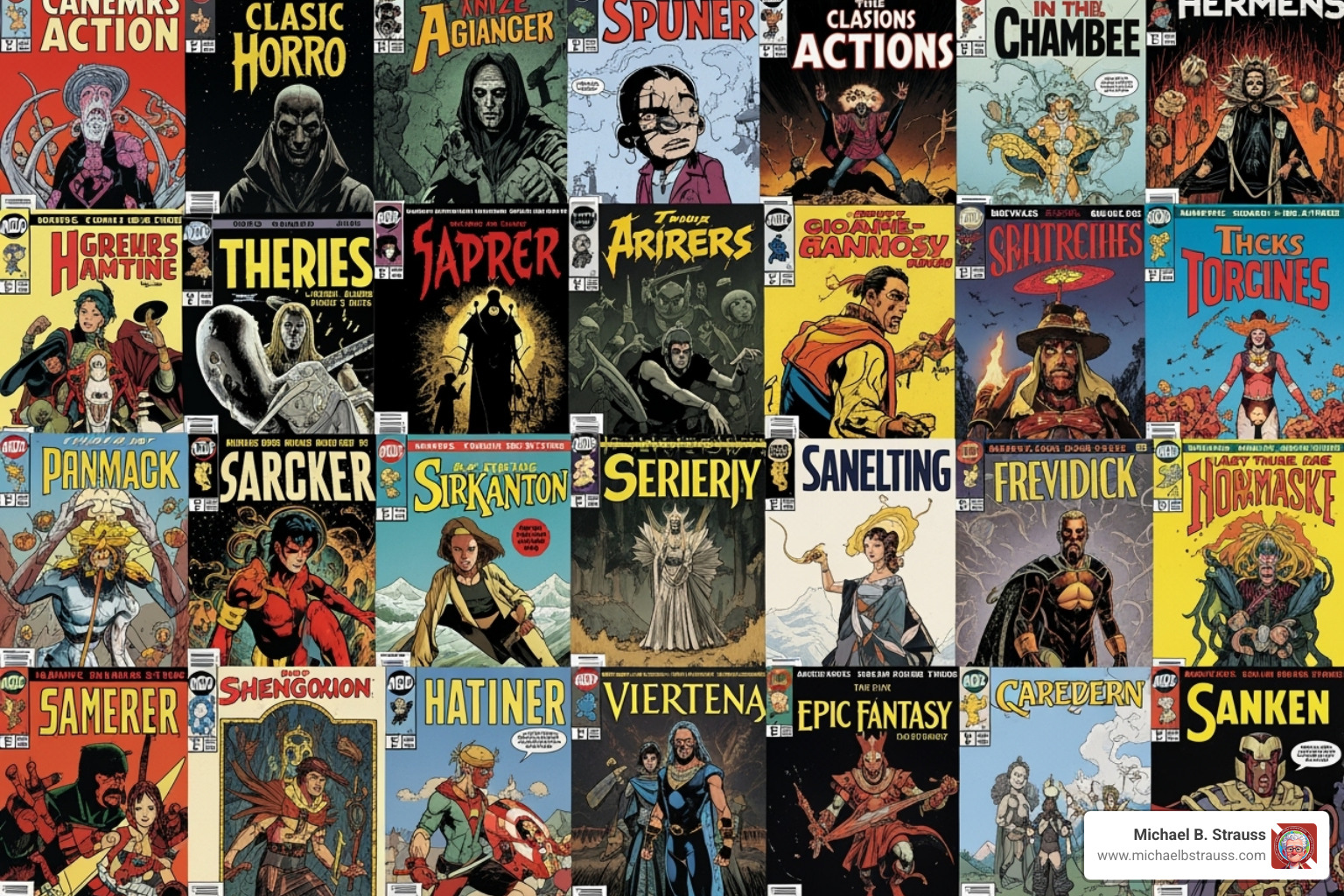Why Comic Book Reviews Matter for Your Reading Journey
Comic book reviews help you find great stories and avoid wasting money on disappointing issues. For anyone hunting for a new superhero saga or an indie gem, reviews save time and guide smart purchases. They also sharpen a valuable life skill: evaluating sources. At MichaelBStrauss.com, we care deeply about informed, evidence-based decision-making—whether you’re curating your reading list or preparing for real-world adventures like scuba diving.
Quick Answer: Where to Find Reliable Comic Book Reviews
- Aggregator Sites: Compare critic scores (like Absolute Superman #10's 9.1/10 rating)
- Specialist Blogs: Get in-depth analysis from expert reviewers
- Video Reviews: Watch visual breakdowns of art and story
- Community Forums: Read honest opinions from fellow fans
- Publisher Websites: Find official previews and early reviews
Modern critics go beyond simple ratings, analyzing story, art, and pacing. Some offer spoiler-free overviews, while others dive deep into themes. This matters because reviews influence buying decisions. When critics praised Poison Ivy #35 (9.5/10) or called The Seasons #1 "a Wes Anderson-tinged horror delight," readers noticed. However, not all reviews are equal. Critics have personal biases, so understanding their perspective helps you find reviewers whose tastes align with yours.
Building this review-savvy mindset isn’t just useful for comics—it mirrors how divers evaluate training materials, procedures, and safety guidance: compare sources, look for the “why” behind recommendations, and choose what best fits your needs and risk profile.

Navigating the World of Comic Book Reviews
Finding your next great read can feel overwhelming. That's where comic book reviews become your trusted guide. Think of them as recommendations from fellow comic lovers who help you decide if a comic is good for you. For many readers—divers included—this is also great practice in critical evaluation: the same habits that help you pick the right story help you assess training resources and plan safe adventures.
Where to Find Reputable Reviews
You'll find passionate voices across multiple platforms, each offering unique perspectives.
Review aggregator sites are a great first stop. Seeing Absolute Superman #10 with a 9.1 average from 13 critics or Poison Ivy #35 with a 9.5 from 4 reviewers gives you an instant consensus.
Dedicated comic blogs and websites offer deep dives into storytelling, art, and themes. They explain why Fantastic Four #19 works as a "gripping film noir tale" or what makes an issue stand out.
Video reviews bring comics to life, letting you see panel layouts and color choices in motion, giving a better sense of the visual storytelling.
Community forums and social media provide unfiltered reader reactions. While not professional critiques, they offer honest opinions from fellow fans.
Publisher websites offer official previews and creator interviews, adding valuable context to upcoming releases.
| Review Source Type | Pros | Cons |
|---|---|---|
| Aggregator Sites | Quick consensus, Broad overview | Lacks nuance, Doesn't explain why |
| Specialist Blogs | In-depth analysis, Expert opinion | Can have strong bias, Less immediate consensus |
| Video Reviewers | Engaging format, Visual examples | Varies in quality, Time-consuming |
Why this matters here: cultivating a healthy skepticism, cross-referencing multiple perspectives, and prioritizing clarity over hype are the same skills that support informed, safety-first choices in the water.
Decoding the Critic's Scorecard
Good critics break down comics into key components.
Writing and plot structure are foundational. Reviewers check if the story flows, dialogue feels authentic, and character choices are believable. They'll flag issues like a "repetitive plot" in The Amazing Spider-Man #49.
Art and visual storytelling are equally important in a visual medium. Critics evaluate pencils, inks, color, and lettering, noting when art perfectly complements the story's mood.
Character development is crucial in ongoing series. Critics track character growth and motivations to see if they feel earned and authentic.
Pacing and world-building determine the reading experience. Reviewers assess if the action feels rushed or if the comic's universe feels consistent and lived-in.
The best reviews explain why these elements work, helping you decide if a comic matches your preferences. That “show your work” mindset—seeking reasons, not just ratings—aligns with how evidence-based guidance is evaluated in safety-focused fields.

Understanding Different Types of Comic Book Reviews
Reviews come in many forms, each serving a different purpose.
Single-issue reviews give immediate reactions to weekly releases, like Storm #11 (9.0) or Daredevil: Cold Day In Hell #3 (8.8), helping you follow ongoing series.
Trade paperback reviews assess complete story arcs, evaluating the narrative as a whole.
Spoiler-free reviews focus on tone, art, and premise without revealing key plot points, perfect for starting a new series.
In-depth analysis explores deeper themes and artistic choices, like describing The Seasons #1 as "Wes Anderson-tinged horror" to convey its specific aesthetic.
Retro reviews revisit older comics, like Deadly Class, with historical context, discussing how a work has aged.
Thematic reviews group comics by topic or genre, helping you find specific types of stories.
Just as these formats serve different reading goals, divers often switch between quick-reference checklists, deep-dive manuals, and case studies—choosing the right level of detail for the decision at hand.
The Critic's Lens: Bias and Style
No review is truly objective. Understanding a critic's perspective helps you interpret their opinions.
Personal taste and genre preference heavily influence reviews. A critic who loves atmospheric stories might praise The Seasons #1 as a "Wes Anderson-tinged horror delight," while an action fan might disagree.
Nostalgia and familiarity with characters can color a critic's judgment of new stories.
Political and social analysis is increasingly common, with some reviewers examining comics as cultural artifacts that reflect or challenge social norms. This approach has deep roots, as seen in discussions about Comic Books as Propaganda.
Stylistic quirks vary, from academic to conversational tones. The goal isn't to find unbiased reviewers, but to find critics whose tastes consistently align with yours.
Recognizing bias is a transferable skill: it helps you filter hype in entertainment and identify trustworthy, evidence-grounded guidance when safety matters.

How to Effectively Use Comic Book Reviews
Use reviews strategically to build your perfect pull list.
- Cross-reference multiple sources. If Resurrection Man: Quantum Karma #5 earns a 9.5 from 4 critics, check individual reviews to see why it scored so high.
- Read multiple opinions on the same comic. One reviewer might focus on art, another on character. Reading several gives you a complete picture.
- Use scores as starting points, not final judgments. An 8.4 for One World Under Doom #6 suggests broad appeal, but the text of the review tells you if it's the right appeal for you.
- Focus on specifics that matter to you, whether it's character depth or spectacular visuals.
- Find reviewers with similar tastes. Their recommendations become a reliable guide.
- Find indie comics and hidden gems. Critics often spotlight titles like The Kobold's Claim (8.5) or Kickstarter comics you might otherwise miss.
- Build a diverse pull list by following reviewers across different genres. This keeps your reading fresh and helps you support creators and your local comic shop.
- Apply the same critical-reading habits to real-world topics: cross-check sources, look for evidence and reasoning, and lean on credible expertise when stakes are high—skills that are central to safety-focused pursuits.
From Panels to Purchases: Making Your Final Choice
Your Next Great Read Awaits
Now it's time to turn research into action. Comic book reviews are powerful tools that shape what we read and how the industry evolves. A scathing review of Dejah Thoris (Vol. 4) #6 (2/10) can save you money, while consistent praise for Resurrection Man: Quantum Karma #5 (9.5/10) points you toward a potential favorite.
This purchasing power is real. Publishers track reviews because positive reception drives sales and can turn an indie comic into a hit. Helpful reviews go beyond a score, explaining why a comic works by analyzing its writing, art, and emotional impact. They might describe The Science of Ghosts as "a wonderful tale that borders on the edge of suspense and the supernatural," giving you a clear sense of its tone.
Reviews also serve as a passport to new genres you might not have considered, from underwater adventures to supernatural tales. The beauty of this journey is that it never truly ends. New comics arrive weekly, and our own tastes continue to evolve. Just as we rely on expert comic book reviews to guide our reading, we also value trusted expertise in other areas of exploration.
For those whose adventures take them from the comic page to the real world, understanding the science behind exploration becomes crucial. Dr. Michael B. Strauss offers invaluable insights for underwater exploration through his comprehensive diving safety expertise. Explore the science of diving to ensure your real-world adventures are as safe as they are thrilling. His evidence-based approach and diving books help both new and experienced divers make confident, informed decisions. Get your copy of his book, Diving Science Revisited, at the following link: https://www.bestpub.com/view-all-products/product/diving-science-revisited/category_pathway-48.html.
Whether you're diving into new comic series or exploring the depths of the ocean, the key is having reliable guidance from trusted experts who understand both the excitement and the importance of safety in any adventure.
DISCLAIMER: Articles are for "EDUCATIONAL PURPOSES ONLY", not to be considered advice or recommendations.






